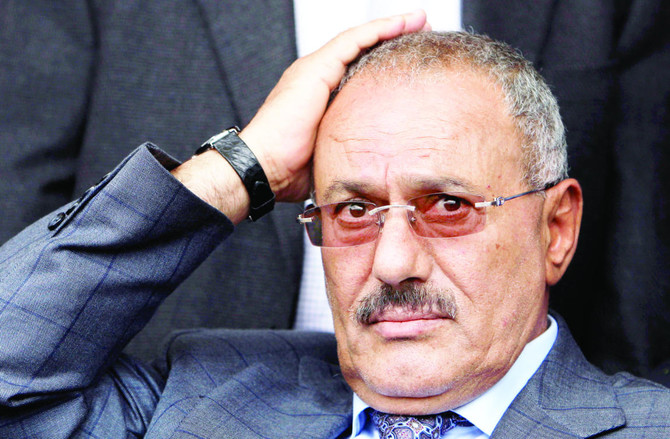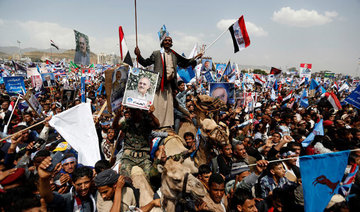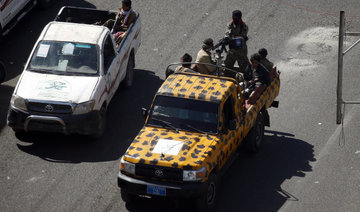SANAA: Ali Abdullah Saleh survived for decades as Yemen’s strongman, the master of shifting alliances, playing both sides — or flipping sides freely — in the multiple guerrilla conflicts and civil wars that tore apart his impoverished nation throughout his life. But his last switch proved his end.
Saleh, who was Yemen’s president for 33 years until he stepped down in 2012 amid an Arab Spring uprising, was killed on Monday by Houthi rebels whom he had once allied with in hopes of a return to power but then turned against in recent months.
A video circulating online showed Saleh’s body, his eyes open but glassy, motionless, blood staining his shirt and a gaping wound In his head.
His grisly end recalled that of his contemporary, Libya’s Muammar Qaddafi, whose body was shown being abused by the rebels who killed him in that country’s 2011 civil war.
During his rule, Saleh was known as the man who “dances on the heads of snakes” for his ability to manipulate friends and enemies alike, using patronage, family bonds and brute force. That skill enabled him to stay on top in the Arab world’s poorest nation and one of its most unstable, where tribal and regional alliances and the sheer geography of mountains and deserts made central rule weak.
In the 2000s, Saleh was a vital ally of the US in fighting Al-Qaeda’s branch in his country, a top priority for Washington after the branch tried to blow up a passenger jet and carry out other attacks on American soil. Even while taking millions in US aid, Saleh was suspected of striking deals with the militants and enlisting them to fight his battles.
After a popular uprising against his rule erupted in 2011, Saleh cannily managed to hang on to power for months, even surviving a bomb that detonated in the presidential palace mosque as he prayed there, severely burning him. Still, he stayed on, only finally resigning in early 2012 under a Saudi-brokered deal.
As president, Saleh fought multiple wars against the Houthi rebels in their heartland in northern Yemen, each time failing to crush them completely. Then after his fall, he allied with the Houthis against his own former vice president and successor, Abed Rabbo Mansour Hadi — most likely in the hope he could ride them back into power.
Saleh’s loyalist military units helped the Houthis overrun the capital, Sanaa, and much of the north and center of the country. Hadi fled, his government moved to the southern city of Aden, and Saudi Arabia and its allies launched a coalition air campaign in early 2015. Then in recent months, Saleh’s alliance with the Houthis fell apart as the rebels moved to weaken him and Saleh flirted with switching to side with the Saudi-led coalition.
Saleh rose to power in an era when Yemen was divided into two nations, north and south. He was born into a small tribe allied with one of the country’s mightiest clans, Al-Ahmar. He did not stay long in school, leaving before he was a teenager and enlisting in the armed forces. His age was not known for sure. His website gives his birth date as March 21, 1946, but many in Yemen say he was born four years earlier. On the other hand, he just happened to be 40 when he took power in 1978 — when the constitution said the president had to be 40. And in the 2006 election, official statements alternated between saying he was 64 and 65.
Whatever his age, Saleh was ambitious and soon caught the eye of North Yemen’s president, Ahmed bin Hussein Al-Ghashmi, who appointed him military chief in the city of Taiz, south of Sanaa.
Saleh’s moment came after a bomb in a briefcase killed Al-Ghashmi in June 1978. Within a month, Saleh was North Yemen’s president, backed by Saudi Arabia.
His reputation cemented as a tough leader, he also knew how to play Cold War politics. Marxist South Yemen was a Soviet client state, so Saleh reached out to Western leaders to leverage aid for North Yemen.
In 1990, with the Soviet Union unraveling, Saleh negotiated unity with the south, ensuring his place as the president. On May 22, 1990, he raised the flag of the Republic of Yemen at the southern port of Aden. Four years later, he crushed an attempt by the south to break free.
His powerful nexus of the military and tribes made him virtually untouchable. He also sought to harness a dangerous new force in the country. Arab militants who had fought the Soviets in Afghanistan in the 1980s needed a new home, and the deal apparently offered by Saleh was sanctuary in exchange for respecting his authority.
In 2000 that legacy came back to haunt him when the Navy destroyer USS Cole was bombed in Aden harbor, killing 17 American sailors. Washington demanded that Saleh crack down on suspected militants.
Saleh’s efforts against extremist groups were widely criticized as spotty and ineffective.
In 2006, a band of Al-Qaeda militants made a bold escape from a Sanaa prison that US and Yemeni officials believed had help from regime insiders. The band went on to form Al-Qaeda in the Arabian Peninsula, the terror network’s Yemen branch. The group was linked to the attempt to bomb a Detroit-bound airliner on Christmas Day 2009 and shipments of explosive-rigged packages were intercepted in Britain and Dubai in 2010. Still, the US saw little choice but to partner with him.
Key dates in life of veteran
• March 21, 1942: Born to a North Yemen family linked to the Hashid tribal confederation.
• 1962: Joins the army. Takes part in the coup that replaces the Zaidi imamate with an Arab nationalist republic.
• 1978: Following the assassination of President Ahmad Al-Ghashmi, Saleh is elected president of North Yemen by a constituent assembly.
• 1990: He successfully steers the country to reunification with the communist south, becoming president of a unified Yemen.
• 1994: He crushes a secession bid in the south.
• 2004-2010: Saleh fights northern Houthi rebels, who like him belong to the Zaidi minority.
• 2012: Steps down on Feb. 27 after months of demonstrations against his 33-year rule, and after being wounded in a June 2011 attack.
• 2014: Saleh allies himself with his former enemies — the Houthis — who in 2015 seize the capital Sanaa, and briefly Aden in the south, which is quickly retaken by a Saudi-led coalition.
• 2017: Break-up of the alliance between Saleh and Houthi rebels, who shoot him dead on Dec. 4 south of Sanaa after he flees the city.
— AFP
Timeline of conflict since 2011 uprising
SANAA: Timeline of the conflict in Yemen since a 2011 uprising that toppled President Ali Abdullah Saleh, whose former Houthi allies said Monday had been killed.
Inspired by regional uprisings in the Arab Spring, Yemenis take to the streets in early 2011 to demand the departure of Saleh, who has ruled the country with an iron fist since 1978.
November 2011: Saleh agrees in to hand over power in exchange for immunity from prosecution for him and his family, after 11 months of protests and deadly clashes.
February 2012: As Saleh steps down, a presidential election is held. Saleh’s deputy and only candidate Abed Rabbo Mansour Hadi, seen as a man of consensus, is sworn in days later. Efforts to draw up a new constitution for Yemen face difficulties and tensions intensify.
2014: Houthis launch an offensive and push toward Sanaa from their northern stronghold of Saada, aiming to expand a hoped-for autonomy within a future federation.
Sept. 21, 2014: Houthis storm the capital and seize the government headquarters, state radio and military sites after days of clashes. More than 270 people are killed. The rebels, backed by Iran, forge an alliance with forces loyal to Saleh.
January 2015: The rebels and their allies have also taken control of the presidential palace. Hadi flees to Yemen’s second city, Aden, which he later declares as the “provisional capital.”
March 26, 2015: Nine regional countries in a Saudi-led Arab coalition launch operation “Decisive Storm” with airstrikes on the rebels to defend Hadi and his internationally recognized government. They claw back some territory but also have to deal with increasing attacks by terrorists allied to Al-Qaeda and Daesh.
2015 and 2016: The UN and US organize three rounds of fruitless peace talks. Seven truces are agreed, but all are broken.
Aug. 23, 2017: Splits emerge in the rebel camp, with the Houthis calling Saleh a “traitor” after he dismissed the Iran-backed group as a “militia” in a speech. The next day, hundreds of thousands of Yemenis attend a rally marking 35 years since the founding of Saleh’s General People’s Congress (GPC) in a major show of support. The tensions erupt into clashes between the allies in which a colonel loyal to Saleh and two rebels are killed.
Nov. 29: Violence erupts anew in Sanaa, killing and wounding dozens.
Dec. 2: Saleh reaches out to the Saudi-led coalition battling the Houthis, offering to “turn the page” if it lifts a crippling blockade on the country. The Houthis accuse him of staging a “coup against our alliance.”
Dec. 4: President Hadi orders his forces to retake control of Sanaa. The Houthi-controlled Interior Ministry announces the killing of Saleh, 75, as a video emerges showing what appears to be his body.
— AFP
Saleh ruled by shifting alliances as nation crumbled
Saleh ruled by shifting alliances as nation crumbled

Iran’s foreign minister heads to Muscat for nuclear talks with US

- Iran will engage in the talks “with authority and with the aim of reaching a fair, mutually acceptable and dignified understanding on the nuclear issue,” a spokesperson said
TEHRAN: Iran’s Foreign Minister Abbas Araqchi has departed for the Omani capital Muscat at the head of a diplomatic delegation for nuclear talks with the US due to be held on Friday, the Iranian Foreign Ministry’s spokesperson said.
The US and Iran have agreed to hold talks in Oman on Friday, officials for both sides said, even as they remain at odds over Washington’s insistence that negotiations must include Tehran’s missile arsenal and Iran’s vow to discuss only its nuclear program.
Iran will engage in the talks “with authority and with the aim of reaching a fair, mutually acceptable and dignified understanding on the nuclear issue,” the spokesperson Esmail Baghaei said on Thursday.
“We hope the American side will also participate in this process with responsibility, realism and seriousness,” Baghaei added.














